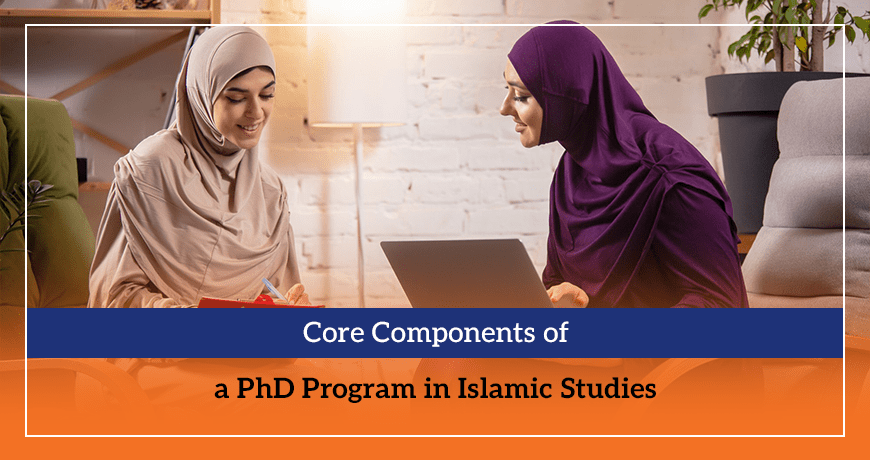What does it take to move from reading about Islam to doing original work on the Qur’an, Hadith, Sharia, and Muslim societies? A PhD in Islamic Studies is the highest research degree for people who want to use primary sources, learn strong methods, and write a thesis that adds new knowledge to Islamic history, theology, law, or modern Muslim life.
This guide helps future students choose the right PhD route with clear choices. It explains how PhD programmes work. It explains what admissions teams want in a research proposal and a writing sample. It explains how Arabic and other research languages affect your options. It covers where to study, how funding and scholarships work, and what jobs graduates take in universities, policy roles, NGOs, museums, publishing, and religious education. Rules can change by country and university, so check each programme’s official pages.
What is a PhD in Islamic Studies?
A PhD in Islamic Studies is a research degree about Islam as religion, thought, and lived practice. The main task is a long thesis, often called a dissertation in some countries. The thesis uses evidence from sources such as Qur’anic tafsir, Hadith collections, legal texts, manuscripts, archives, or field research in Muslim communities.
Many universities teach Islamic Studies in Religious Studies, Theology, Middle Eastern Studies, or Arabic and Islamic Studies departments. Programme names vary. The core fields often stay similar. Common areas include Qur’anic studies, Hadith studies, Islamic law, usul al fiqh, kalam, aqidah, Islamic philosophy, and Islamic history.
A strong PhD in Islamic Studies starts with one clear research question. It needs a clear plan for evidence. Text-based work often uses close reading of classical Arabic texts and modern scholarship. Social research can use interviews and observation. Social research can study schools, charities, mosques, and community groups. It often uses methods from anthropology or sociology.

Key areas of study in a PhD in Islamic Studies
A PhD in Islamic Studies lets you focus on one area and still understand the wider field. Many programmes mix text study, history, and careful use of evidence.
Islamic history and civilisation
Islamic history studies how Muslim societies formed and changed over time. Topics can cover rule, scholar networks, schools, social change, trade, and ideas. Sources can include chronicles, biographies, travel writing, letters, court records, and objects.
Qur’anic studies and tafsir
Qur’anic studies look at the Qur’an’s language, compilation history, and interpretation. Many PhD projects focus on tafsir. These projects compare classical commentaries with modern readings. Topics can cover themes, ethics, and links between interpretation and social life.
Hadith studies
Hadith studies focus on transmission, method, and meaning. PhD work can study debates on authenticity and canon formation. PhD work can study how Hadith is used in law and ethics. Strong Arabic reading skills are often needed for this area.
Islamic law, Sharia, and legal theory
Islamic law research studies fiqh, madhhab traditions, usul al fiqh, and Sharia in modern life. A thesis can study fatwa practice. A thesis can compare legal schools. A thesis can study bioethics, finance, family law, and human rights debates. Many projects link classical legal texts with real legal systems in a specific country.
Islamic theology, kalam, and philosophy
Islamic theology studies beliefs about God, prophecy, reason, revelation, and moral duty. Kalam traditions can be studied through classical texts and later commentaries. Islamic philosophy projects can study key thinkers and debates. These projects can study links between philosophy, theology, and law across history.
Modern and contemporary Islamic thought
Modern Islamic thought studies reform, revival, political movements, and Muslim responses to colonialism and modernity. PhD work can focus on texts, institutions, education, activism, and public debate. Many projects connect religious ideas with politics, ethics, and social change.
Sociology and anthropology of Islam
This path studies lived religion in real communities. Topics can include ritual, ethics, family life, education, identity, migration, and community institutions. Many projects use fieldwork. These projects use sound methods for interviews, observation, and data analysis.
Interfaith and comparative studies
Interfaith and comparative studies examine relationships between Muslims and other faith communities. Projects may compare beliefs and ethics across traditions or study how interfaith dialogue works in real settings. Evidence can come from texts, historical records, or community case studies.
Why pursue a PhD in Islamic Studies?
A PhD in Islamic Studies suits people who want long-term research training and deep subject knowledge. The degree builds skills used in academia and outside it. These skills include close reading, clear argument, checking evidence, and strong writing.
Academic and teaching careers
Many graduates aim for university jobs in Islamic Studies, Religious Studies, Theology, or Middle Eastern Studies. PhD training can add teaching practice and research publishing. Academic hiring is competitive. Many students plan early for papers, conferences, and language study.
Policy, NGOs, and interfaith roles
A PhD can support work in think tanks, research groups, charities, and interfaith centres. Knowledge of Islamic law, ethics, history, or modern Muslim societies can help with education policy and community work. It can help with peacebuilding and development projects. These roles often need clear writing for non-specialists.
Cultural, religious, media, and publishing roles
Museums, archives, and manuscript libraries hire people who can explain Islamic heritage to the public. Religious institutions may hire scholars for curriculum work and advanced teaching. Publishing and media roles can include editing, translation support, documentary research, and subject review.
Intellectual growth and contribution
Many candidates choose a PhD to study hard questions about religion, ethics, and society with academic rigour. A well-planned thesis can support public understanding and community discussion.

Core components of a PhD programme in Islamic Studies
A PhD programme is a multi-year commitment. Some countries use a thesis-first model with fewer taught parts. Other countries use major coursework before the thesis stage. Requirements can change by university, so check the official programme pages.
Coursework and advanced seminars
In coursework-based models, early study uses seminars in Islamic history, theology, philosophy, law, Qur’anic studies, Hadith method, and research methods. Students can join reading groups and language classes. Many classes use classical Arabic texts.
Qualifying or comprehensive exams
Many programmes use exams to test your grasp of key fields and key debates. Exams can be written or oral. Passing these exams often marks the move to full PhD candidacy.
Dissertation research and writing
The thesis is the core of the degree. You find a research gap. You build an argument. You gather evidence. You write with support from a supervisor and a committee. A strong thesis shows skill with sources and method.
Language training and primary sources
Arabic is central for many specialisations. This is common in Qur’anic studies, Hadith, Islamic law, and classical theology. Some projects need Persian, Turkish, Urdu, Malay, or other languages. Many programmes set language targets during the PhD. If you are applying in the UK, check the UK Secure English Language Test requirement.
Fieldwork and archival research
Some theses need time in libraries, archives, or communities. Archival work can use manuscripts and old records. Fieldwork can use interviews and observation in Muslim communities. Both need ethics planning and clear methods.
Admission requirements and how to choose the right PhD programme
Choosing a programme is serious research work. The best match links your topic, your languages, your method, and strong supervision.
Clarify your research direction
Start with one clear area. Common options include Islamic history, Qur’anic studies, Hadith, Islamic law, theology, philosophy, or contemporary Islam. Decide if your work is mainly text-based, history-based, or social research. A narrow question helps admissions teams judge focus and feasibility.
Match supervisors and departmental strengths
Supervisor fit matters for most PhD projects. Read staff profiles and recent work. Check if your question fits the supervisor’s expertise. A strong match supports good supervision and a workable plan.
Prepare a strong research proposal
A good proposal states a clear question. It explains the research gap in simple terms. It names key primary sources. It sets out the method. A short chapter plan can help. Admissions teams want clarity and feasibility.
Build your application materials
Many programmes ask for transcripts, references, a writing sample, and a research proposal, plus items like writing a clear motivation letter. Some ask for language proof and an interview, and you may also need help with securing strong recommendation letters. Each university has its own rules, so check the latest deadlines and formats.
Consider location and learning environment
Location shapes access to archives, language study, research networks, and travel. Some students prefer Muslim-majority contexts. Other students prefer the UK, USA, Canada, or Australia, with large libraries and mixed discipline supervision.

Best countries to study a PhD in Islamic Studies
Choosing a country is not only about rankings. The best choice matches your research area, source access, language needs, funding, and PhD format. Some countries favour a research only model with supervision and milestones. Other countries add coursework and exams before the thesis stage.
United Kingdom
The United Kingdom suits applicants who want a clear research route with close supervision and strong libraries, and it helps to review guidance on studying in the UK as an international student. Many UK doctorates start with the thesis. Students take research training and join seminars. Progress reviews are common. This format can suit candidates with a strong master’s thesis and a well formed question.
Example universities in the UK
- University of Edinburgh, Islamic and Middle Eastern Studies PhD
- University of Exeter, Arabic and Islamic Studies PhD
What to check before applying in the UK
- Research proposal rules
- Supervisor fit for your topic
- Arabic and language training options
- Funding routes and deadlines
- Milestones, upgrade rules, and viva format
Who the UK tends to suit
- Students with a ready research plan
- Students who want less coursework
- Students who want close supervision
United States
The United States suits applicants who want broad training before the thesis stage, and it can help them understand the wider process of studying in the USA as an international student. Many US programmes include seminars, language study, and exams in the early years. This format can help you build wide skills across Islamic Studies and related fields before the thesis.
Example universities in the USA
- University of California, Los Angeles, Islamic Studies PhD
- Yale University, Religious Studies with an Islamic studies track
- New York University, Middle Eastern and Islamic Studies pathways
- Georgetown University, Arabic and Islamic Studies PhD
- Columbia University, PhD in Islam within Religion or related fields
- University of Washington, Near and Middle Eastern Studies and Arabic and Islamic studies routes
- Boston University, Religious Studies PhD with Islamic studies options
What to check before applying in the USA
- Where Islamic Studies sits in the university
- Language requirements and test dates
- Exam structure and timing
- Funding length, stipend terms, and teaching load
- Support for fieldwork and archive travel
Who the USA tends to suit
- Students who want structured training
- Students who want teaching experience
- Students who want time to refine a topic
Canada
Canada offers strong research settings and diverse Muslim communities. This can suit community based research. Many Canadian programmes mix supervision with academic training. Library access is often strong.
Example universities in Canada
- McGill University, Institute of Islamic Studies
- University of Toronto, Middle Eastern and Islamic studies related PhD routes
What to check before applying in Canada
- Coursework rules
- Funding terms and length
- Arabic and language training
- Library collections and advice on manuscripts
- Student visa and work rules
Who Canada tends to suit
- Students who want a stable research setting
- Students who plan community based work in North America
- Students who want a balance of structure and freedom
Australia
Australia can suit work on contemporary Islam, identity, and migration, including Asia Pacific Muslim communities. Many universities run thesis focused PhDs with clear milestones.
Example universities in Australia
- Australian National University, Arab and Islamic studies related PhD routes
- University of Melbourne, PhD in Arts with Islamic topics by supervision
- University of South Australia, Religious Studies PhD options linked to Islam topics
What to check before applying in Australia
- Supervisor match and method fit
- Milestones and confirmation rules
- Scholarship access for international students
- Fieldwork support and ethics steps
- Language training for Arabic or other languages
Who Australia tends to suit
- Students working on modern topics
- Students using social research methods
- Students with a clear thesis plan
Qatar and Gulf based international programmes
Qatar and some Gulf based universities offer structured PhD programmes in Islamic Studies. Some focus on applied ethics and public life. Others mix modern scholarship with classical sources.
Example university in Qatar
What to check before applying in Qatar and the Gulf
- Language of teaching and Arabic needs
- Coursework and milestone rules
- Scholarship access for international students
- Topic fit for sensitive themes
- Library access and research networks
Who this region tends to suit
- Students who want a structured route in a Muslim majority setting
- Students focused on ethics, law, or public life
- Students who want regional links and networks
Saudi Arabia and other Muslim majority contexts
Saudi Arabia and other Muslim majority countries can suit work in Qur’anic sciences, Hadith, Sharia, and classical theology, often in Arabic medium programmes. Programme styles vary by institution and can affect how your thesis is assessed.
Example universities in Saudi Arabia
- Islamic University of Madinah
- Imam Mohammad Ibn Saud Islamic University
- Umm Al Qura University
- King Abdulaziz University
What to check before applying in Muslim majority contexts
- Language rules and Arabic writing needs
- Thesis rules and assessment style
- Supervisor access and supervision style
- Degree recognition for your job market
- Research limits and ethics rules for your topic
Who Muslim majority contexts tend to suit
- Students focused on classical texts and Arabic sources
- Students who want language immersion
- Students planning roles in religious education
Turkey, Malaysia, and Indonesia
Turkey, Malaysia, and Indonesia can suit region based research, such as Ottoman and Turkish Islamic history or Southeast Asian Islamic thought and institutions.
What to check before applying in these countries
- Supervisor fit and main research language
- Archive access and permissions
- Scholarship access for international students
- Local ethics rules for fieldwork
- Degree recognition for your job market
Who these countries tend to suit
- Students working on Ottoman, Turkish, or Southeast Asian Islam
- Students who need local archives or communities
- Students who can work in Turkish, Malay, Indonesian, or Arabic
India and Pakistan
India and Pakistan offer PhD routes linked to South Asia’s Islamic traditions. Many programmes mix classical study with modern academic rules. Quality and resources can vary across institutions.
Example universities in India
- Aligarh Muslim University
- Jamia Millia Islamia
- Osmania University
- Maulana Azad National Urdu University
- Jamia Hamdard
- Islamic University of Science and Technology
Example universities in Pakistan
- University of the Punjab
- National University of Modern Languages
- Riphah International University
- University of Lahore
What to check before applying in India and Pakistan
- Supervisor access and recent PhD work in your field
- Library access and Urdu or Persian resources
- Fieldwork support and method rules
- Degree recognition for your job market
- Funding, fees, and travel costs
Who India and Pakistan tend to suit
- Students working on South Asian Islamic history and thought
- Students using Urdu, Persian, or local archives
- Students who want regional immersion tied to sources
Key research areas and specialisations
Specialisation shapes your sources, method, and career path.
Islamic theology
Research can focus on kalam, debates on reason and revelation, and texts on prophecy and ethics.
Islamic law and contemporary legal issues
This track studies fiqh, usul al fiqh, madhhab traditions, fatwa practice, and modern legal debate about Sharia.
Qur’anic studies
Projects may compare tafsir traditions, study Qur’anic language, or study how interpretation links to ethics and gender.
Islamic philosophy and intellectual history
This track studies philosophical texts, commentaries, and debates across periods.
Sociology and anthropology of Muslim societies
This area studies lived religion, community institutions, education, identity, and migration.
Interfaith relations
Projects can study historical encounters, dialogue work, and comparative theology.
Funding and scholarships for a PhD in Islamic Studies
Funding shapes where many students can study.
University scholarships and bursaries
Many universities offer internal scholarships. Some cover tuition and add a stipend. Funding can be competitive.
Teaching assistantships and research assistantships
Many programmes offer teaching or research roles to PhD students. These roles can bring pay and training.
External fellowships and grants
Some students get support from foundations, cultural institutes, or government schemes. Awards can cover tuition, travel, or living costs.
How to approach funding planning
Start early. Apply widely. Keep a list of deadlines. Keep a clear budget for the full study period. Funding rules can change year to year.
Career opportunities after a PhD in Islamic Studies
A PhD builds skills that can fit many sectors. Outcomes often link to specialisation, language skills, teaching practice, and published work.
Academia and higher education
Graduates apply for lecturer roles, postdoctoral work, and research jobs.
Cultural and heritage institutions
Museums, archives, libraries, and cultural centres hire scholars for curation, cataloguing, and education.
Government, diplomacy, and NGOs
Graduates work in policy, education, cultural advice, and development work.
Religious institutions and community education
Some graduates work in mosques, Islamic centres, and education bodies.
Media, publishing, and consultancy
Work can include editing, research support, and subject expertise for documentaries and reporting.
Challenges and how to navigate them
A PhD can be rewarding. It needs long term focus.
Time, workload, and motivation
Doctoral study can take years. It can include teaching, coursework, and travel. A realistic plan and steady writing help.
Language and research difficulty
Classical Arabic can be hard. Manuscripts can add extra challenge. Plan for steady language study.
Funding pressure
Scholarships and assistantships are competitive. Apply to more than one source. Build a budget for tuition and living costs.
Wellbeing and isolation
Long projects can feel lonely. Build support through seminars, peer groups, and mentors.

Frequently asked questions
How long does a PhD in Islamic Studies take?
Many programmes take three to eight years. Time varies by country, structure, and study mode.
Do I need Arabic for a PhD in Islamic Studies?
Arabic is needed for many fields, such as Qur’anic studies, Hadith, Islamic law, and classical theology.
What are the typical job prospects?
Graduates work in universities, research institutes, NGOs, government advisory roles, cultural institutions, religious education, and publishing.
How can I prepare before applying?
Read core scholarship in your field. Improve Arabic and other needed languages. Build research practice in a master’s thesis.
Conclusion
A PhD in Islamic Studies uses primary sources, research methods, supervision, and thesis writing to answer one clear question with evidence. This guide has covered programme formats, supervisor fit, admissions needs, funding routes, language planning, and career paths across countries.
Before you apply, check each university’s latest entry rules and completion notes. Refine your proposal so the question, sources, and method fit well. Write to potential supervisors and ask if your topic fits their research area.